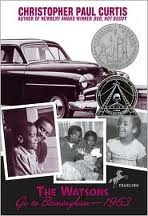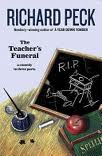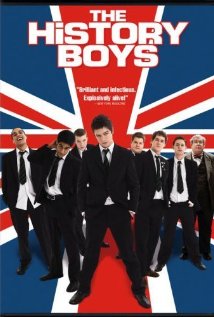Glen Huser’s Movie and Book Picks for September, 2011
My Book Picks: The Watsons Go to Birmingham ~ 1963 and The Teacher’s Funeral: a Comedy in Three Acts
I belong to a “Young Adult” book club here in Vancouver. No – I’m not trying to pass myself off as a young adult. The club is made up of writers who craft young adult novels. We meet four times during the year, generally choosing a couple of books to discuss at each meeting. Our fall meeting is always in September, and getting together last week, we looked at two novels in which humour was a dominant element: The Watsons Go To Birmingham – 1963 by Christopher Paul Curtis and The Teacher’s Funeral: A Comedy in Three Acts by Richard Peck. We had been reading some pretty heavy teenage problem novels for our previous meeting – so these were chosen as a counterpoint (and we were all happy to read something lighter over the summer).
I had rather guiltily suggested The Watsons to the group because I suspected it might be actually for a younger audience than adolescent readers. But it was a novel I’d somehow missed reading over the 16 years since its publication – and was still longing to read – so I thought I might sneak it in under the wire. One of the points that came up in discussion was that, while the narrator is a precocious ten-year-old, the book emerges as a story that is particularly focused on the character of his older brother, Byron, who is thirteen. It may even be more Byron’s story than Kenny’s story. Certainly this is a book I wouldn’t have hesitated to share with junior high classes when I was teaching – and, really, it is a book for all ages.
The Watsons are an African-American family living in Flint, Michigan, in 1963. Kenny’s dad has grown up there, but his mother is from Alabama, and – during the bitterly cold days of a Northern winter — she mourns the warm South. When it appears that Byron is determinedly practicing-up to become a juvenile delinquent, Mom and Dad decide to park the teen with his grandmother in Birmingham for a year and see if he can get himself turned around, and so the family piles into their 1948 Plymouth (dubbed the “Brown Bomber”) for a marathon trip to Grandma’s (with no stop-overs).
Curtis is in his element searching out the humour of situations (as Byron manages to get his lips stuck to the car’s sideview mirror in the dead of winter and is caught by Mom playing war games with burning toilet-paper parachutes – to mention a couple). And he plays with dialogue in a way that reminded me of Bill Cosby’s early recordings. So funny. I love the way that Mom’s southern accent thickens as she becomes excited or angry.
And now the amazing part: the narrative, so filled with the laughter and warmth of this family, segues into a confrontation with that different world of prejudice and murder that swirls through the South as the Civil Rights movement gains momentum in the early ‘60’s. Somehow Curtis accomplishes this about-turn seamlessly. There is an element of magic in Kenny’s little sister Joey escaping the carnage of the bombing of a church in which she was attending Sunday School along with the four little girls who were killed. But the real magic is how this tragedy pulls the Watsons toward a new perspective on their family ties.
The second book – Richard Peck’s The Teacher’s Funeral – is another humorous novel with historical underpinnings. This one examines a small Midwest community in 1904. When the teacher of their one-room schoolhouse dies, fifteen-year-old Russell is horrified at the prospect of his older sister, Tansy, taking on the job. His only hope is that there won’t be enough students – they need a minimum of eight – to keep the school operative.
If the Watson’s narrative turned out to be truly Byron’s story, Peck’s novel edges towards being Tansy’s tale. She has her work cut out for her as she faces such crises as a beginning student (one of the crucial eight) determined to run home and never return, a snake in her desk drawer, a school privy on fire, and an explosion of stove-pipe dust the day of the superintendent’s visit. Tansy is a strong-minded girl determined to succeed and a good deal of the fun of the novel is watching how she builds on the deceased teacher’s pedagogy in ways that are innovative, sensible and humane.
Peck populates his comedy with a wonderful cast of supporting characters including a tobacco-chewing backwoods matriarch (one can imagine Marjorie Main playing her with gusto back in the 1950’s) and a mouthy mountainous landowner who tests the students’ engineering skills when they need to heft her out of a ditch by the schoolyard. Russell and Tansy’s father is a wise and gentle presence in the background.
My grandfather, Oren Daily, was from the Midwest during the time that Peck writes of, and he often recounted adventures of being a student and then a teacher. Anecdotes that would leave us holding our sides with laughter. I couldn’t help feeling he was chuckling somewhere in the background as I read Peck’s novel.
My movie Pick: The History Boys
September always puts me in a back-to-school frame of mind. So much of my life revolved around either attending school as a student, teaching elementary and junior high classes, visiting schools as a learning-resources consultant, or working with teachers-in-training at universities in Alberta and BC. Years didn’t start in January for me; they always began in September.
Among films that showcase a school setting, one of my favourites is “The History Boys”, filmed in 2006, adapted by Alan Bennett from his award-winning play, and directed by Nicholas Hytner, who was at the helm of the original production at the Royal National Theatre in London. A bonus for filming the play within a couple of years of its debut was being able to use the stage cast for the movie – a truly outstanding assembly of young actors as the students and an excellent seasoned cast for the instructors.
Set in a boys’ grammar school in Sheffield in 1983, the drama unfolds around a group of high-achieving seniors, in their final year, preparing to apply to Oxford or Cambridge. A general studies instructor, the portly “Hector” (Richard Griffiths) has worked with this group before and they are very forgiving of his penchant for fondling them at times (especially if they happen to be perched on the back of his motorcycle for a ride home). Irwin (Stephen Campbell Noore), a young instructor who has been brought in to “polish” the class, also finds himself attracted to one of the students but is cautioned by the history teacher, Mrs. Linott (Frances de la Tour), to resist any involvement.
Central in the group of boys is Dakin (Dominic Cooper), a handsome rascal involved in an affair with the school secretary (Georgia Taylor), but who is not above playing on Irwin’s feelings for him. If this is sounding rather steamy and tabloid-flavoured, let me hasten to say that the film, while it never shies away from acknowledging the hormones raging in a school filled with adolescent boys, it is equally an examination of how we teach and what we teach – of how we make meaning of history and pop culture, the literature and films and art that surrounds us. It is about how easily we can become focused on “getting through” rather than stopping and discovering the importance of “now”.
There are scenes that bring me back to watching the movie again and again. We have Hector tutoring Posner (Samuel Barnett), a sensitive teen with a beautiful voice, on Hardy’s poem “Drummer Hodge” – and Posner reciting the beautiful, touching lines about the boy buried in the veldt. Posner (perhaps my favourite character in the film) singing “Bewitched, Bothered and Bewildered,” his gaze intent on a Dakin who is barely embarrassed over the fact that everyone seems to be falling in love with him. The boys acting out scenes from old movies, hoping to win a bet and stump Hector or Irwin. Mrs. Linott giving an impassioned speech on the role of women in history to the students in the midst of a practice session for their admission interviews – and, at the end of the film, addressing the boys’ future selves.
The film is funny – and heartbreaking. Sort of the way I see life.



